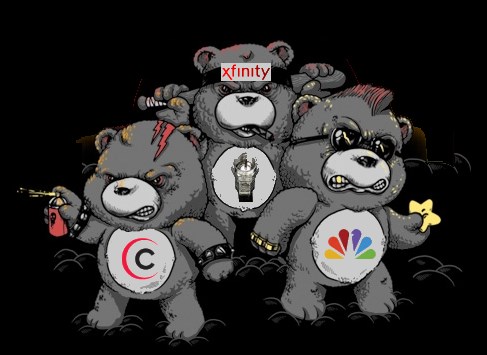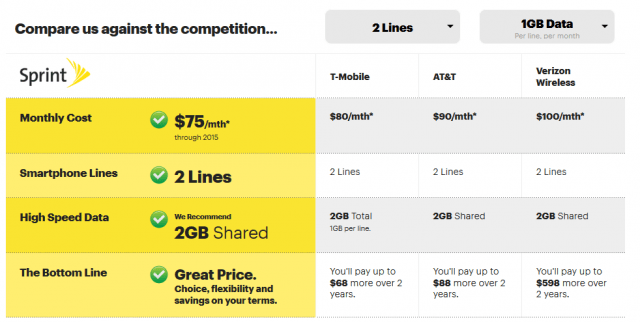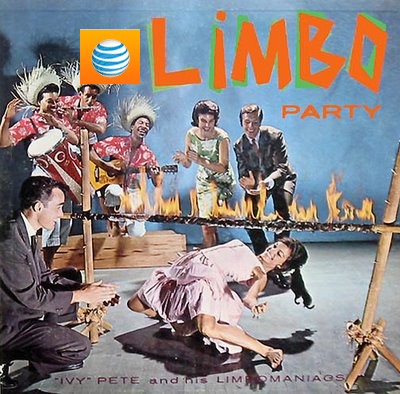
The Don’t Care Bears
A few weeks ago, Stop the Cap! reported on the story of Conal O’Rourke, a Comcast customer billed for equipment he didn’t order, service he didn’t receive, and collection agents he didn’t deserve. When O’Rourke dared to complain to senior Comcast management in the company’s Controller’s Office, the controller himself called a senior partner at his employer and days later O’Rourke was fired.
Now O’Rourke is taking his case to court, claiming he lost his job because Comcast forced his employer – PricewaterhouseCoopers – to weigh his benefit against a $30 million consulting contract Comcast has with the major accounting firm.
The complaint names names and gives plenty of new details about how Comcast ruthlessly deals with customers who dare to bother its top executives with petty little service problems like $1,800 in unjustified billing, credit score-ruining collection activity, and the impossibility of canceling service.
The fateful call to Comcast’s Controller’s Office occurred back in February, and consisted mostly of his complaint that in the almost one year that he had been a Comcast customer, he had not received a single bill in which the charges were correct.
When he mentioned the constant billing errors might be of interest to the independent Public Company Accounting Oversight Board, it was the first time in more than a year Comcast efficiently targeted O’Rourke’s complaint for its brand of resolution: retaliation.
“Unfortunately, instead of redressing Mr. O’Rourke’s grievances, Comcast initiated a scorched-earth assault against him for expressing concerns over the legality of its conduct and the integrity of its accounting,” the lawsuit states. “On information and belief, defendants undertook these actions because they were concerned that Mr. O’Rourke would report them to the PCAOB, were angry that he had accused them of shoddy accounting practices, and wished to punish and destroy him for his temerity.”
O’Rourke claims Comcast ordered a background check on him and the results were forwarded to the controller himself — Lawrence Salva, who also happens to be a former partner at PricewaterhouseCoopers.
Quicker than you can say “rate increase,” Salva was on the phone to Joseph Atkinson, the U.S. Advisory Entertainment, Media & Communications Leader for the accounting firm. He specializes in the cable business, so it was no surprise Comcast reached out to him to vent.
“Less than an hour after Mr. O’Rourke’s second call with Comcast’s Controller’s Office, Mr. O’Rourke received a call from Mr. Atkinson,” the lawsuit claims. “Mr. O’Rourke was shocked to receive the call – he had never before had occasion to deal with Mr. Atkinson. An angry Atkinson informed Mr. O’Rourke that he had received a call from Comcast’s Controller about Mr. O’Rourke. Mr. Atkinson told Mr. O’Rourke that the client was very angry, very valuable, was in fact the Philadelphia office’s largest client, with billings exceeding $30 million per year, and that Mr. O’Rourke was not to speak with anyone from Comcast.”
A few days later, security arrived with cardboard boxes allowing O’Rourke to collect his belongings and exit the building… permanently.
The accounting firm has refused to disclose the contents of email exchanged between itself and Comcast. If Comcast divulged personal information about O’Rourke, it may be in violation of federal privacy laws.
O’Rourke remains out of work and Comcast is alleged to still be refusing all requests to refund him the money it overcharged.
O’Rourke is asking for $1 million plus punitive damages for violation of the Cable Communications Policy Act, defamation, breach of contract, unfair business practices and infliction of emotional distress.
[flv]http://www.phillipdampier.com/video/CNN Comcast Dispute Gets Man Fired 10-8-14.mp4[/flv]
CNN talked with Conal O’Rourke, fired after complaining too much about Comcast, worth $30 million a year in contracts to his employer. (6:43)
 One of the largest grocery chains in the United Kingdom is giving away free unlimited 16Mbps broadband for a year, including a free wireless router, as long as customers cover the usual monthly line rental fees.
One of the largest grocery chains in the United Kingdom is giving away free unlimited 16Mbps broadband for a year, including a free wireless router, as long as customers cover the usual monthly line rental fees.

 Subscribe
Subscribe If your family budget cannot handle a $200 monthly cell phone bill from AT&T or Verizon and you can keep your data usage to around 1GB, Sprint has a deal for you.
If your family budget cannot handle a $200 monthly cell phone bill from AT&T or Verizon and you can keep your data usage to around 1GB, Sprint has a deal for you.



 T-Mobile has asked the Federal Communications Commission to investigate AT&T’s “artificially high roaming rates” charged when its customers travel outside of T-Mobile’s home service area.
T-Mobile has asked the Federal Communications Commission to investigate AT&T’s “artificially high roaming rates” charged when its customers travel outside of T-Mobile’s home service area. Because of AT&T’s artificially high roaming rates, T-Mobile wireless customers roaming in South Africa have a better user experience than customers roaming on AT&T’s network in South Dakota, argues T-Mobile. Their speed is twice as fast, and their data usage is unlimited.
Because of AT&T’s artificially high roaming rates, T-Mobile wireless customers roaming in South Africa have a better user experience than customers roaming on AT&T’s network in South Dakota, argues T-Mobile. Their speed is twice as fast, and their data usage is unlimited.